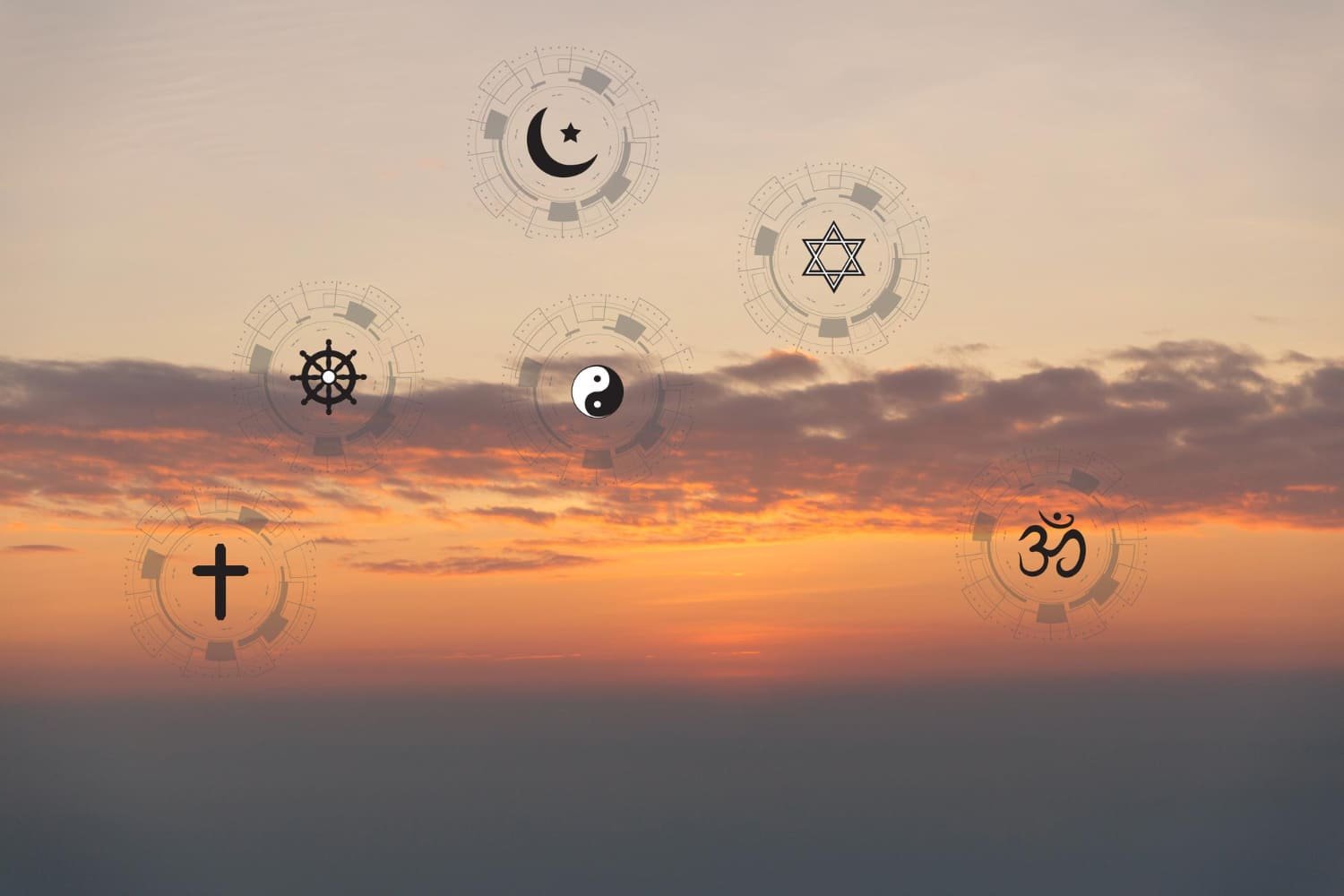Buddhism and Christianity are two of the world’s most popular religions, with millions of followers around the globe. While both religions have some similarities, they also have significant differences in their beliefs, practices, and origins.
These differences have led to debates and discussions about which religion is better or more accurate.
Buddhism is a nontheistic religion that originated in ancient India and is based on the teachings of Siddhartha Gautama, also known as the Buddha.
The Buddha taught that the ultimate goal of life is to achieve enlightenment, which involves freeing oneself from suffering and the cycle of rebirth.
Christianity, on the other hand, is a monotheistic religion that originated in the Middle East and is based on the life and teachings of Jesus Christ. Christians believe in one God who created the universe and sent his son, Jesus, to save humanity from sin and death.
History of Buddhism and Christianity
Buddhism has its roots in ancient India, dating back to the 5th century BCE. It was founded by Siddhartha Gautama, also known as the Buddha, who was born into a royal family but left his privileged life to seek enlightenment.
He spent years meditating and studying before achieving enlightenment and sharing his teachings with others.
Christianity, on the other hand, is a relatively newer religion that originated in the Middle East in the 1st century CE. It is based on the life and teachings of Jesus Christ, who was born into a Jewish family and began preaching at the age of 30. He gained a following but was eventually arrested and executed by the Roman authorities.
After his death, his followers continued to spread his message, and Christianity eventually became the dominant religion in Europe and much of the world.
Both religions have had a significant impact on the world, with Buddhism influencing many cultures in Asia and Christianity shaping Western civilization. While they have different origins and histories, they share some common themes, such as the importance of compassion, love, and selflessness.
However, they also have fundamental differences, such as their beliefs about the nature of God or the ultimate goal of existence.
Buddhism is generally non-theistic and emphasizes the importance of achieving enlightenment and breaking the cycle of suffering, while Christianity is monotheistic and emphasizes the importance of faith in God and the promise of eternal life.
Overall, the history of Buddhism and Christianity is complex and multifaceted, with both religions evolving over time and influencing the world in different ways.
Beliefs and Practices
Buddhism and Christianity are two distinct religions with different beliefs and practices. While Christianity is a monotheistic religion that believes in a single God, Buddhism is a non-theistic religion that does not believe in a supreme creator being.
Christianity teaches that Jesus Christ is the Son of God and the savior of humanity. Christians believe in the Holy Trinity: the Father, the Son, and the Holy Spirit. They also believe in the concept of sin and the need for salvation through faith in Jesus Christ.
Buddhism, on the other hand, is based on the teachings of Siddhartha Gautama, also known as the Buddha. The Buddha taught that the ultimate goal of life is to achieve enlightenment, which is the state of being free from suffering and ignorance. Buddhists believe in the Four Noble Truths and the Eightfold Path as the means to achieve enlightenment.
Christianity places a strong emphasis on prayer, worship, and the reading of scripture. Christians attend church services and participate in sacraments such as baptism and communion. They also believe in the power of prayer and the importance of personal devotions.
Buddhism, on the other hand, emphasizes meditation and mindfulness as the means to achieve enlightenment. Buddhists practice meditation to develop concentration, mindfulness, and insight. They also participate in rituals such as chanting and bowing as a means of expressing devotion and respect.
Comparison of Major Tenets
While both Buddhism and Christianity are religions that aim to provide guidance on how to live a meaningful life, they differ greatly in their beliefs and practices.
Here are some of the major tenets of each religion:
Buddhism
- Buddhists believe in the Four Noble Truths, which state that suffering is a part of life, suffering is caused by desire, suffering can be overcome, and the way to overcome suffering is through the Eightfold Path.
- Buddhists do not believe in a supreme being or creator, but rather in the concept of karma, which holds that one’s actions in this life will affect their future lives.
- Buddhists strive for enlightenment, or the state of being free from suffering and ignorance.
- Buddhists practice meditation as a means of achieving enlightenment.
Christianity
- Christians believe in one God who created the universe and everything in it.
- Christians believe that Jesus Christ is the son of God and that he died on the cross to save humanity from sin.
- Christians believe in the concept of original sin, which holds that all humans are born with a sinful nature inherited from Adam and Eve.
- Christians strive to follow the teachings of Jesus Christ and to live a life of love and service to others.
- Christians believe in the concept of salvation, which holds that by accepting Jesus Christ as their savior, they can be forgiven for their sins and achieve eternal life in heaven.
As can be seen from the above, the major tenets of Buddhism and Christianity differ greatly. While Buddhists aim to achieve enlightenment through meditation and the Eightfold Path, Christians strive to follow the teachings of Jesus Christ and to live a life of love and service to others.
Buddhists do not believe in a supreme being or creator, while Christians believe in one God who created the universe and everything in it. Ultimately, the choice of which religion to follow is a personal one that depends on individual beliefs, values, and experiences.
Differences in Views on God and the Afterlife
One of the biggest differences between Buddhism and Christianity is their views on God and the afterlife. Buddhism does not believe in a creator God who controls the universe or rewards and punishes individuals based on their actions. I
nstead, Buddhism teaches that individuals are responsible for their own actions and the consequences that follow. Buddhists believe in karma, the idea that one’s actions determine their future, and rebirth, the belief that after death, one is reborn into a new life based on their karma.
On the other hand, Christianity believes in one God who created the universe and all living beings. Christians believe that God is a loving and just God who rewards and punishes individuals based on their actions.
Christianity teaches that individuals have one life on earth and after death, they will either go to heaven or hell based on their relationship with God and their actions on earth.
Another difference is their views on the afterlife. In Buddhism, the ultimate goal is to achieve enlightenment and break the cycle of rebirth, known as samsara. Buddhists believe that achieving enlightenment will lead to nirvana, a state of peace and liberation from suffering.
In contrast, Christianity teaches that after death, individuals will either go to heaven, a place of eternal happiness and closeness to God, or hell, a place of eternal punishment and separation from God.
It is important to note that these are generalizations and there are variations within each religion’s beliefs. For example, some Christians believe in the concept of purgatory, a temporary state of purification before entering heaven, while some Buddhists believe in the existence of deities and supernatural beings.
However, these differences in views on God and the afterlife highlight the fundamental differences between the two religions.
Similarities and Differences in Ethics and Morality
Both Buddhism and Christianity have ethical and moral codes that guide their followers’ behavior. However, there are significant differences in how they approach and define these concepts.
One of the main differences is that Christianity is based on the belief in a personal God who created the world and has a plan for humanity.
In contrast, Buddhism is a non-theistic religion that does not recognize a supreme being. Instead, it focuses on the individual’s journey towards enlightenment and liberation from suffering.
Another difference is the role of morality in each religion. Christianity emphasizes the importance of following God’s commandments and living a virtuous life to achieve salvation.
In contrast, Buddhism emphasizes the concept of karma, which is the belief that one’s actions have consequences that can affect their future lives. Buddhists strive to live a moral life not to please a deity but to avoid negative consequences and progress towards enlightenment.
Despite these differences, both religions share some ethical principles. For example, both emphasize the importance of compassion, love, and forgiveness. Christianity teaches that one should love their neighbor as oneself, while Buddhism emphasizes the importance of loving-kindness towards all beings.
However, there are also some differences in how these principles are applied. For example, Christianity teaches that forgiveness is a virtue that should be extended to all, even one’s enemies.
In contrast, Buddhism emphasizes that forgiveness should be balanced with wisdom and discernment and that one should not forgive someone who is likely to continue causing harm.
Another difference is the concept of non-violence. While both religions teach that violence is generally wrong, Buddhism takes a stronger stance against it. Buddhists believe in non-violence towards all beings, including animals, and many follow a vegetarian or vegan diet.
In contrast, Christianity has historically condoned violence in certain circumstances, such as in self-defense or in war.
Overall, while there are some similarities in the ethical and moral principles of Buddhism and Christianity, there are also significant differences in how these principles are applied and understood.
Which One Is Better? Conclusion
When it comes to the question of which one is better, Buddhism or Christianity, there is no easy answer. Both religions have their own unique strengths and weaknesses, and ultimately, it is up to the individual to decide which path is right for them.
One of the advantages of Buddhism is its emphasis on personal responsibility and the power of the individual to transform themselves.
The Four Noble Truths and the Eightfold Path provide a clear roadmap for spiritual growth and self-improvement. Additionally, Buddhist practices such as meditation and mindfulness can be beneficial for reducing stress and improving mental health.
On the other hand, Christianity offers a strong sense of community and support for its followers. The teachings of Jesus Christ emphasize love, compassion, and forgiveness, and the church provides a place for believers to come together and support one another.
Christianity also offers the promise of eternal life and salvation through faith in Jesus.
Ultimately, the decision of which religion is better is a deeply personal one, and each individual must weigh the pros and cons of each path for themselves. It is important to approach this decision with an open mind and heart, and to seek guidance and support from trusted sources.







